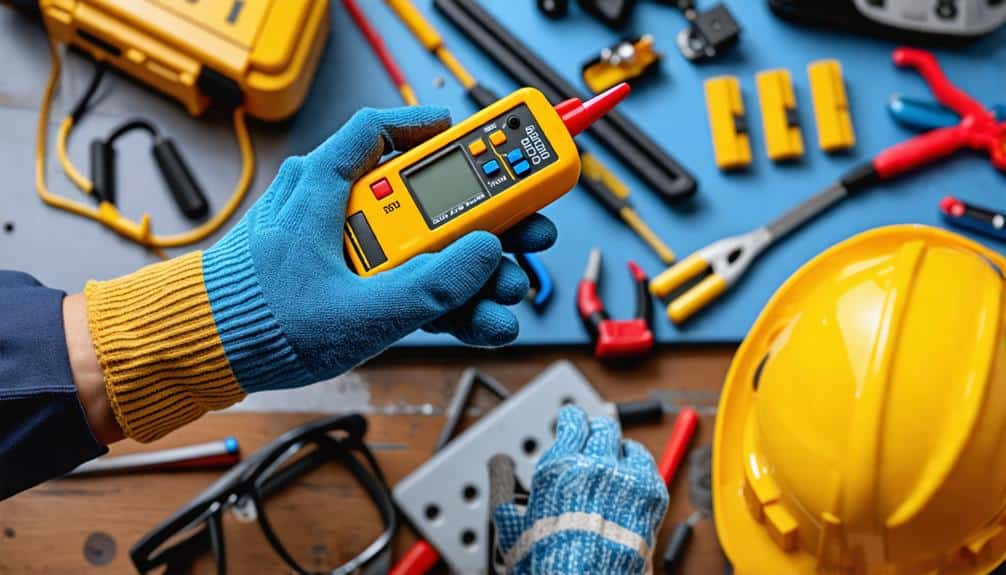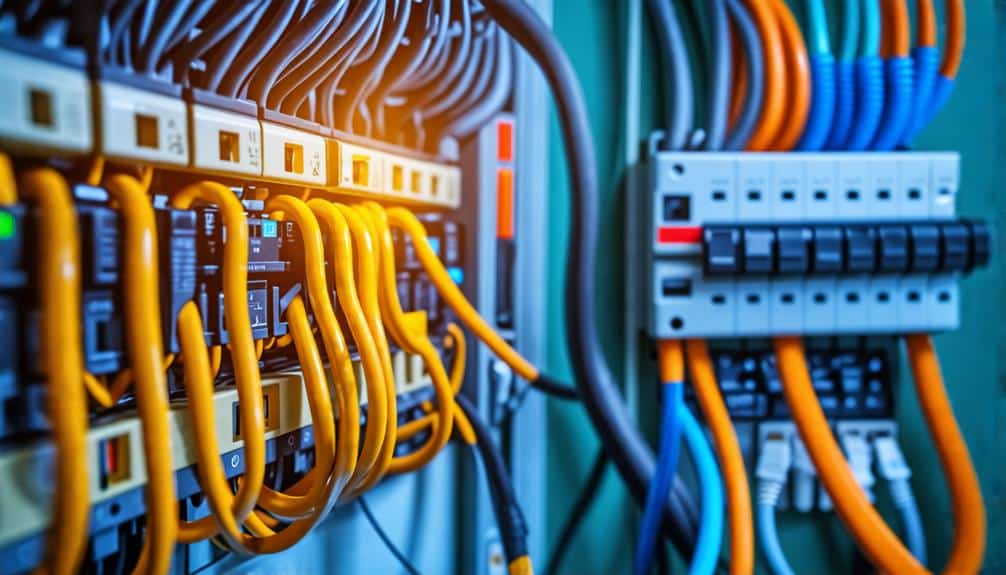Be extra careful when working on electrical stuff in your home. Always use the right circuit breakers for new appliances and don’t plug too many things into one outlet. Get a licensed electrician to check your electrical work often. Read and follow appliance instructions carefully.
Check your outlets and circuit breakers regularly for signs of wear. When renovating, make sure you have good airflow and use materials that won’t get damaged by water.
Keep all electrical parts in good shape and update them when needed. To keep your home and family safe, always ask experts for advice on your renovation project.
Key Takeaways
- Before Renovating, Inspect Electrical Systems: Identify signs of old, unsafe wiring and upgrade to newer safety features to avoid electrical hazards.
- Hire Licensed Electricians: Ensure electrical work is done by certified professionals to prevent electrical fires and shocks.
- Manage Moisture and Ventilation: Install proper ventilation in bathrooms and kitchens, use moisture sensors, and maintain good airflow to prevent electrical fire hazards.
- Use Protective Equipment: Wear appropriate gear like respirators, gloves, and goggles when working with hazardous materials to prevent injury.
- Practice Safe Wiring: Correctly ground wires, use surge protectors, and keep cords organized to prevent electrical shocks and surges.
Electrical Safety Essentials
To stay safe during electrical renovations, focus on key safety basics. This protects you and your home from dangers.
First, make sure you use the right circuit breakers for new appliances. They need to handle the power safely. Always read and follow appliance instructions.

Watch out for outlets with too many plugs, as they can overheat and start fires.
It’s smart to hire experts to check your electrical work. They make sure everything follows building rules. Licensed electricians know how to connect wires safely.
Containing Moisture Risks
Keep your home safe from water and electricity dangers by controlling moisture. This is really important in areas that get wet a lot.
- Make sure your bathrooms and kitchens have good fans. These fans help get rid of extra moisture in the air.
- Put in moisture sensors. These will warn you when things get too damp, so you can fix the problem before it hurts your electrical stuff.
- Use materials that don’t soak up water when you fix up your home. This helps protect against water damage.
- Check your electrical parts often. Look for problems before they turn into big dangers.
Preventing Fires and Shock
To stop electrical fires and shocks at home, you need good electrical systems. This means having outlets and circuit breakers that work well. These parts keep your home and family safe. Make sure they’re put in right and taken care of.
|
Checkpoint |
Description |
Action |
|---|---|---|
|
Check outlets and circuit breakers |
Look at outlets and circuit breakers often for wear |
Fix loose connections and damage quickly |
|
Put in Ground Fault Circuit Interrupters (GFCIs) |
Add GFCIs where there’s water |
Stop shocks and fires |
|
Keep things cool and clean |
Make sure air can flow to stop overheating |
Clean up to avoid fires |
When you follow these safety steps, you make your home safer. This protects you and others working on your home.
Safe Wiring Practices
Check your home’s wiring often to keep your renovation project safe from fires. Good wiring keeps your home and everyone working on it safe.
Ground Wires Correctly: Make sure all wires are grounded to stop shocks and power surges.
Use Surge Protectors: These devices soak up extra electricity, which lowers the risk of fires and melted parts.
Tidy Up Cords: Keep cords neat to avoid tripping. Look for any damage or frayed spots.
Ask an Expert for Big Jobs: When you’re doing big electrical work, always talk to a licensed electrician. This helps you avoid dangerous mistakes.
Dealing With Outdated Wiring
Old wiring in homes can be risky and might need to be replaced to keep your house safe during renovations. When fixing up a home, it’s important to spot old wiring. You might notice lights that flicker, smells of burning, or old fuses instead of circuit breakers. These signs show that the electrical system can’t handle the power needs of today’s appliances and gadgets.
Old wiring can cause shocks, damage your stuff, and even start fires. It’s crucial to make sure your wiring follows current safety rules.
To stay safe, experts say you should upgrade old wiring with new safety features. These include Ground Fault Circuit Interrupters (GFCIs) and Arc-Fault Circuit Interrupters (AFCIs). These devices help prevent shocks and fires.
It’s also a good idea to have regular electrical checks to find any safety problems and make sure your electrical system is strong and up-to-date.
Avoiding Overloaded Circuits
To stop electrical overloads, you need to know how much power your home’s circuits can handle and what your appliances need. Overloads can shock you, start fires, or break things.
Put big power-hungry appliances like air conditioners and dryers on different circuits. This stops one circuit from getting too much work.
Look at your outlets often. Make sure they’re not worn out or getting too hot.

Add surge protectors to your electrical system. They soak up extra voltage and keep your system safe.
Never plug appliances into extension cords or multi-outlet strips. This can overload your circuits and might start a fire.
Handling Mold and Asbestos
When fixing up old homes, you need to be careful with mold and asbestos. These things can make you very sick.
It’s important to find asbestos before you start work. Older houses often have asbestos in their materials. If you disturb it, harmful fibers can get into the air. Always call experts to check for asbestos and remove it safely.
Also, watch out for lead paint in houses built before 1978. It can release toxic dust when disturbed. Always wear safety gear like masks and special clothes when dealing with these hazards.
Check your home often to make sure mold and asbestos stay under control. This keeps your home safer to live in.
Toxic Materials and Chemical
When fixing up your home, it’s important to watch out for toxic stuff and chemicals that can make you sick.
- Test First– Before you start, check for lead paint if your house is old. This helps you avoid getting sick from lead dust.
- Throw Away Safely – Get rid of dangerous materials the right way. Follow local rules when tossing out paint, glue, and other chemicals to keep people and nature safe.
- Protect Yourself – Wear safety gear like masks, gloves, and goggles when working with toxic stuff. Keep the air moving and don’t breathe in or eat any dust.
- Learn About Materials – Find out about the stuff you’re using in your project. Learn how to handle it safely to keep you and your family healthy.
Protective Equipment and Gear
Wearing the right safety gear can really cut down on risks when you’re fixing up your home. Things like respirators, gloves, and goggles act like a shield between you and dangerous stuff. Respirators clean the air you breathe, gloves keep your hands safe from burns and shocks, and goggles protect your eyes from flying bits and splashes.
Good air flow is super important too. Close off the work area to keep dust and fumes from spreading. Open windows and use fans to move fresh air through your home during and after your project. Don’t forget to clean up well when you’re done to get rid of any leftover harmful stuff.
Taking care of your ladder is a must for safely reaching high spots. Check your ladder often for any damage and fix or replace worn-out parts. Make sure you set it up right too. Put the bottom on flat ground and lean it at the right angle so it won’t slip.
Emergency Preparation and Response
Getting ready for emergencies during home renovations is really important. You need a good disaster kit and a plan to handle surprises. Make sure you have a generator for backup power when the lights go out. Also, think about ways to protect your home from flooding as you plan your renovations.
Write down what everyone should do in different emergencies. Include how to leave the house and how to stay in touch.
Pack things like flashlights, batteries, first aid stuff, and food that won’t go bad.
Watch the weather forecast, sign up for alerts from your power company, and follow official social media for updates about outages and emergencies.
Charge your phones and tablets, have a backup power source ready, and unplug appliances so they don’t get damaged.
Conclusion
Fixing up your home can be exciting, but it’s super important to be safe. This article gave you lots of good tips to keep you and your family out of danger during your home makeover. Remember to be extra careful with electrical stuff, watch out for water damage, and always use the right safety gear. By following these tips, you can make your home better without putting anyone at risk.
If you want to make your home awesome and safe at the same time, why not talk to the experts at MWCR Homes? We know all about making homes look great while keeping everyone safe. You don’t have to figure everything out by yourself – MWCR Homes can help you every step of the way. Want to learn more about how they can help? You can get a free consultation with MWCR Homes to start planning your safe and amazing home makeover today. Don’t wait – take the first step towards your dream home now!
